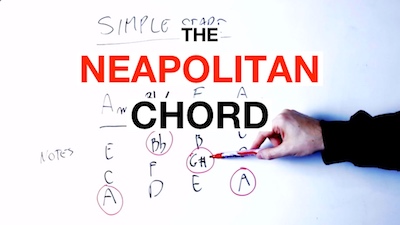Bland Chord Progressions? Try The NEAPOLITAN Chord


If you play a major triad and a minor triad to most people, and you ask them which of the two is more 'tense' and less 'happy', then the overwhelming majority will tell you that minor triads are more tense.
So it stands to reason that if you want to create more tension in your chord progressions, you should use more minor triads and less major triads.
This is a clear, reasonable, even obvious deduction... and it's wrong.
Why?
Because it does not take into account that the quality (major or minor) of the chords is not the only factor that determines tension.
Another important factor for instance is how the chords in the progression relate to the tonic chord in the key.
For instance in this video we are going to see how changing two triads from minor to major (counterintuitively) can substantially increase the tension in a chord progression - and how you can do it too in your music.
In the process we'll also learn about the Neapolitan chord - this is a 'secret weapon' for songwriter, and it is worth watching the video if only to learn about it ;)
And it does not end here! Because, as you know, there is not only a Neapolitan chord (video above) but also there are two Neapolitan scales that you can use with this chord!
Firs of all, let's see the Neapolitan Minor scale:
And then let's see the Neapolitan Major scale, and the kind of harmonies that you can get from it:
But the Neapolitan chord is but one of the many tasty chromatic chords that you can use in your music. There are more than I can list here, and they are all the jealous secret of professional songwriters.
If you want to learn all about these chords and how to write songs with them, then you can find here what you need: the Complete Chord Mastery guitar course.
In this course all the theory is done directly on the guitar fretboard, without doing any complex 'math'. This is the course that you want if you ever had problems applying the concepts you learn to the guitar.
Did you find this video helpful? Do not miss the next Music Theory videos!
Subscribe to the MusicTheoryForGuitar YouTube channel by clicking the button below.